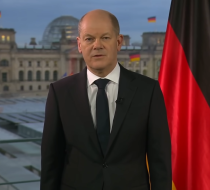Deepfake Activism: Campaign Uses AI to Target Germany's Far-Right Party Favorite
The German government is considering legal action after a deep fake video of Chancellor Olaf Scholz calls for the far-right AfD party to be banned.
The German government is reviewing its approach to deep fake technology after a satirical video featuring Chancellor Olaf Scholz was created by activist group the Centre for Political Beauty (ZPS). In the video, Scholz appears to announce a ban on the far-right Alternative for Germany (AfD) party at the Federal Constitutional Court on the fifth anniversary of the death of Walter Lübcke. Lübcke was a CDU politician who was shot dead by a right-wing extremist in 2019.
He also calls for evidence of anti-constitutional activities to be submitted to a website created by the ZPS. The video, while not perfectly lip-synched, is similar in style to the Chancellor's usual videos.
ZPS wants to build database of "incriminating information"
The afd-verbot.de platform serves as a database for "incriminating information" about the AfD. This information, e.g. quotations of racist statements, comes from various sources and can be linked to the respective "suspects".
The video and website are part of a wider campaign by the ZPS. The centerpiece of the campaign is an installation in front of the Federal Chancellery in Berlin, depicting a prison with AfD officials and known party supporters as inmates.
Last Friday, the ZPS addressed numerous AfD members with a fake letter. In the name of the "Federal Executive Board, it demands emails, photos, chat histories, and other material that could potentially incriminate the party. According to ZPS founder Philipp Ruch, this method has already yielded a "massive" amount of further evidence from within the party.
Government warns of the dangers of using deep fake technology
Speaking at a press conference in Berlin, government spokesman Steffen Hebestreit warned of the dangers of using deep fake technology. He said that deep fakes were increasingly infiltrating the public sphere, with even major tabloids using AI fakes for advertising purposes. Hebestreit warned that the development of the technology could have an impact on public opinion and urged people to be vigilant. He also noted that hostile powers are trying to use AI to spread fake news and create uncertainty. The possibility of legal consequences for the Scholz fake is being explored, as it becomes increasingly difficult to distinguish between real and fake content.
Since its inception, ZPS has used provocative actions to address issues such as genocide, racism, the arms industry and refugee policy. One particularly controversial action took place in 2017, when a miniature replica of the Berlin Holocaust Memorial was erected next to AfD politician Björn Höcke's house in Thuringia in response to his comments on Germany's historical responsibility.







